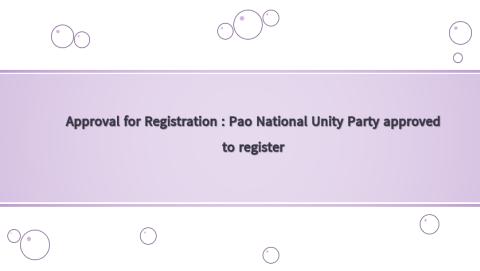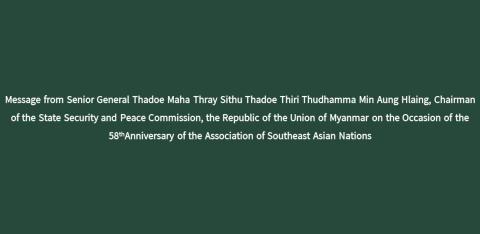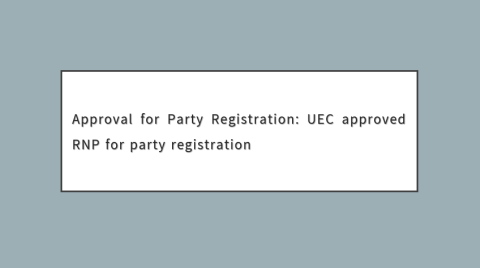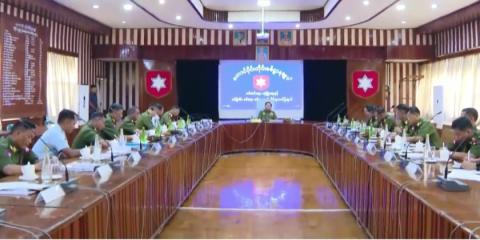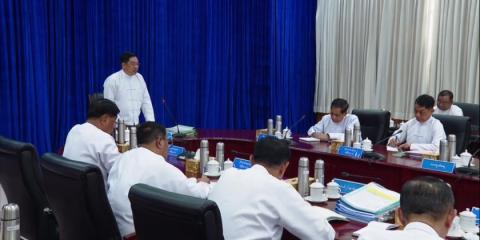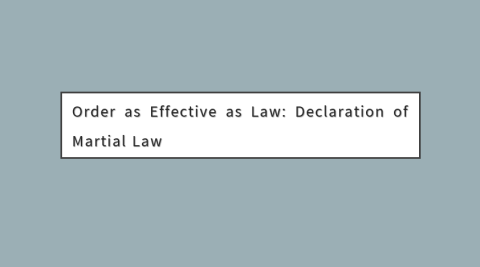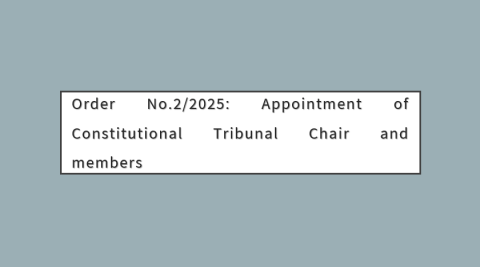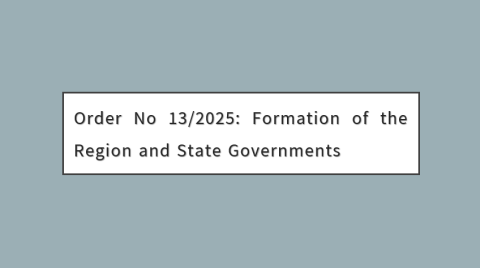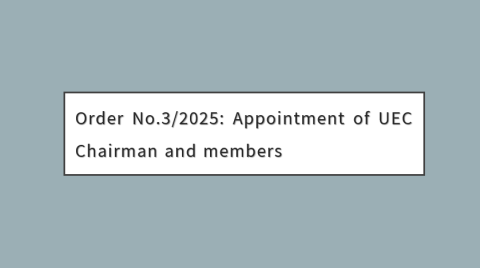(8 August 2025)
Esteemed Citizens of Myanmar and the Peoples of ASEAN,
On the auspicious occasion of the 58thAnniversary of the Association of Southeast Asian Nations (ASEAN), I extend my heartfelt greetings and best wishes to all citizens of Myanmar and the peoples across ASEAN Member States, as we commemorate the 58th anniversary of our shared journey toward peace, prosperity, and regional unity. I wish all our peoples continued peace, development, and prosperity in the years ahead.
Since its inception in 1967, ASEAN has remained steadfast in its mission to promote regional peace, stability, development, and shared prosperity. With our combined efforts, wisdom and vision of the Member States, ASEAN has grown into a robust regional community promoting peace, stability, and prosperity. Myanmar is proud of being an integral part of this journey and steadfast in upholding the ASEAN Charter, recognizing its vital role in ensuring that our collective vision for a peaceful and prosperous Southeast Asia.
ASEAN was established in 1967 by Indonesia, Malaysia, the Philippines, Singapore, and Thailand. Brunei Darussalam joined in 1984, followed by Vietnam in 1995, Myanmar and Laos in 1997, and Cambodia in 1999. This remarkable journey reflects the collective path undertaken by ASEAN member states, and we recall with honour and record with appreciation that, through our joint efforts, we all have driven ASEAN's growth and accomplishments across political, economic, and socio-cultural dimensions.
As ASEAN commemorates its 58th anniversary, it has transformed Southeast Asia from a region once marked by conflict and division into one of cooperation, peace, and growing prosperity.Key milestones in ASEAN's history include the establishment of the ASEAN Community in 2015, built on political-security,economic and socio-cultural pillars in the region.ASEAN has taken a leading role in fostering dialogue, security cooperation, and regional integration through key forums such as ASEAN Regional Forum (ARF), East Asia Summit (EAS), ADMM-Plus. Additionally, it is with a matter of satisfaction to note that the implementation of the ASEAN Community Vision 2025 is in good progress.
The year 2025 marks a pivotal moment for ASEAN Community Vision 2045— a time to review achievements, recalibrate priorities, and chart a comprehensive strategy to achieve the goals of the ASEAN Community Vision 2045 - “Resilient, Innovative, Dynamic, and People-Centered ASEAN”. It serves as a launchpad for ASEAN to reaffirm its commitment to unity, sustainable development, economic dynamism, and regional peace— ensuring that by 2045, ASEAN is a globally respected and thriving community.
The Association must be competitive, robust, responsive, and well-connected in the face of fast changing geo-politics and the world economic trends. With this backdrop, it is obvious that the theme of the 2025 ASEAN Chairmanship “Inclusivity and Sustainability”, resonates well with our shared commitment to regional peace, security, stability, and development. In order to strengthen ASEAN's crucial role in engineering the regional security architecture, we must work together to consolidate ASEAN's centrality and unity.
Our unity, anchored in the ASEAN Charter — which enshrines territorial integrity, national sovereignty, non-interference, peaceful resolution of disputes, good governance, and multilateral cooperation— remains ASEAN’s guiding beacon. In the face of complex regional and global challenges— geopolitical shifts, economic disruptions, and climate-related crises— ASEAN has shown adaptability and resilience by collectively charting pathways forward.
Today, we reaffirm our commitment to the Charter’s principles, and the Treaty of Amity and Cooperation — the core instrument in its relations with the Dialogue Partners. Myanmar stands firm in its commitment to ASEAN’s unity and centrality, guided by the principles and aspirations of the ASEAN Charter. Despite the diverse political, cultural, and economic landscapes of our Member States, ASEAN’s strength lies in our ability to work together in unison while respecting each nation’s sovereignty.
The principle of non-interference, as outlined in the ASEAN Charter, ensures that we address regional challenges without external imposition, preserving the integrity of our collective decision-making of consensus. Myanmar stands firmly with ASEAN in rejecting any form of external interference.
Esteemed Citizens of Myanmar and the Peoples of ASEAN,
As we commemorate the 58th Anniversary of ASEAN, let us reaffirm our commitments to the ideals of unity in diversity, collective resilience, and shared prosperity. Let us celebrate this year’s Anniversary of ASEAN not only with pride in our past achievements, but also with collective resolve to safeguard peace, foster prosperity, and nurture the cultural richness of our region.
I wish all our peoples across the ASEAN Member States continued success, peace and prosperity in the years ahead. May the enduring spirit of ASEAN continue to live collectively in the hearts of our peoples.
Senior General Thadoe Maha Thray Sithu
Thadoe Thiri Thudhamma Min Aung Hlaing
Chairman, State Security and Peace Commission
of the Republic of the Union of Myanmar

